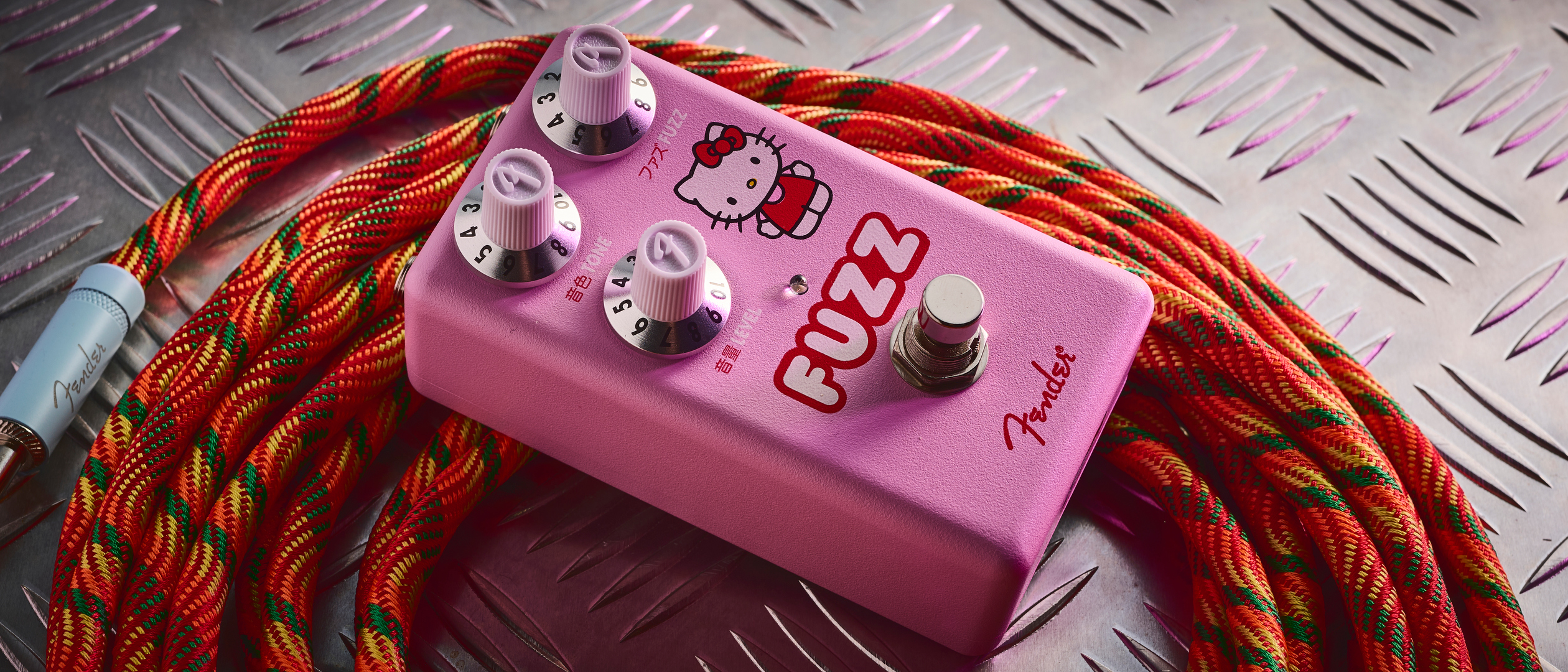Guitar World Verdict
The Hello Kitty Fuzz looks so cute. But don’t be fooled. Like many of her feline counterparts, animal passions stir within, with a sound so mean you worry this fuzz will walk off your ‘board one night and return with a songbird in its mouth.
Pros
- +
Cute design, wild tones, and versatile.
- +
Compact, easy to use and just $99.
- +
The enclosure is built like a tank.
Cons
- -
It doesn't have the octave mode of Fender's Hammertone Fuzz.
- -
Wild and woolly: too much woof for some cats?
You can trust Guitar World
What is it?
It is one of the tropes of guitar effects pedal culture that designers look to the animal kingdom when naming their fuzz pedal, and we are fully onboard with this.
There’s something thematically appropriate about it. Of all the effects on your pedalboard, it is the fuzz that has the greatest capacity to rewild your electric guitar tone and chew through the speaker cone. There are some we would even blame for that stain on the rug…
You’ve got the the Z.Vex Woolly Mammoth, the Fuzzly Bear from KMA Machines, the Fulltone Queen Bee, the EHX Lizard Queen. You might even include the Beetronics Tuna Fuzz in that list, albeit the animal in question has been steamed and canned. There’s the Foxx Tone Machine and its posthumous Warm Audio clone. Way Huge has its Purple Platypus and Catalinbread has its Katzenkönig “King of the Cats” Tone Bender/Rat crossbreed. And now Fender has one, too.
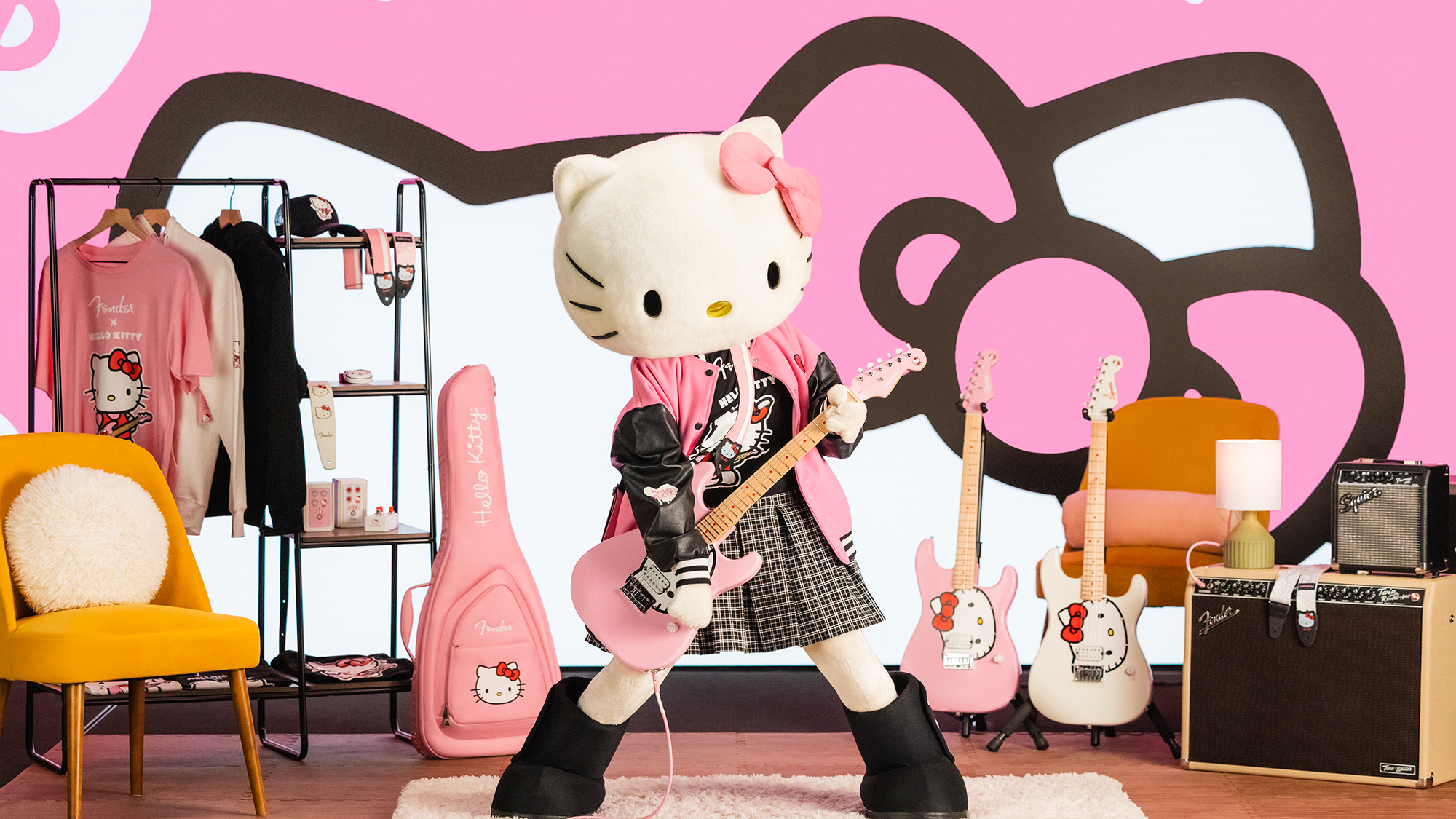
The Fender Hello Kitty Fuzz is released as part of a collection celebrating the 50th anniversary of the Japanese cartoon cat, which includes the return of the cult classic Squier Stratocaster, new and improved and shipping now in pink or white finishes, alongside an extensive range of accessories and wearables.
Like the Strat, you can choose between pink and white versions of the Hello Kitty Fuzz. Both have Yuko Shimizu’s cat graphic staring impassively back at you, red bow by her left year, paws by her side, with “FUZZ” painted in big bold bubble font. All this seems too cute to step on, right? But there is an op-amp fuzz circuit in that housing, and when tone is the line, you’ve got to do what you’ve got to do…
Specs
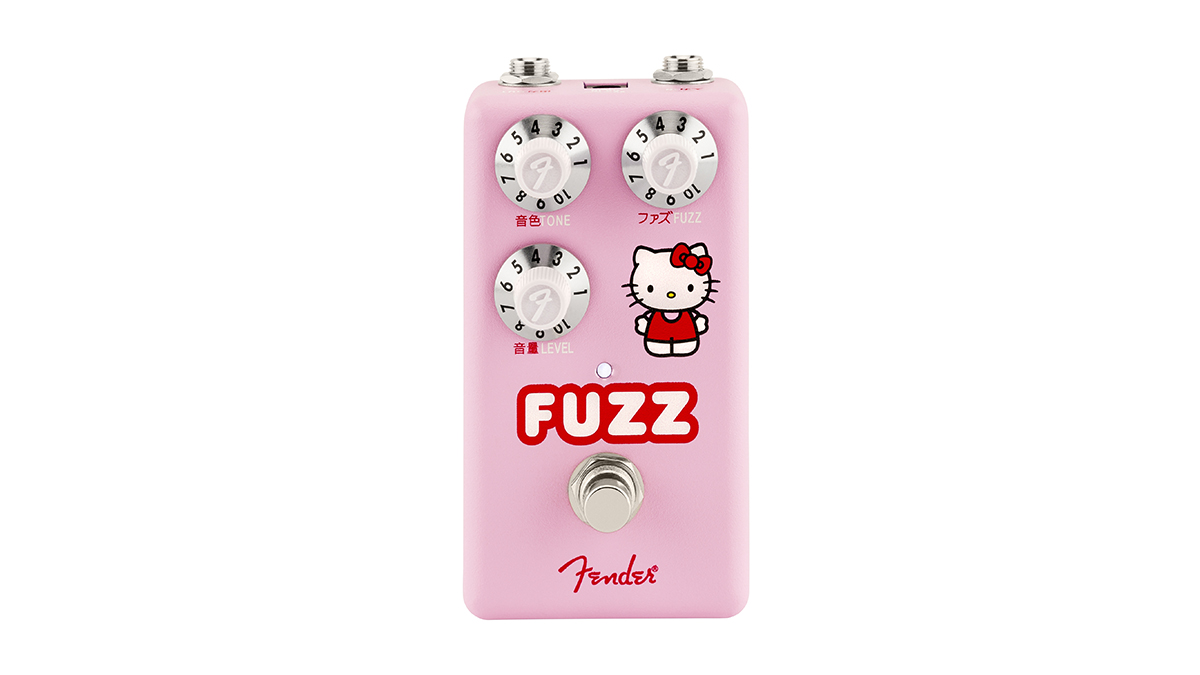
Launch price: $99/£94/€109
Type: Op-amp fuzz pedal
Made: China
Controls: Volume, Tone, Fuzz, internal trim pot for treble
Connections: 1/4” input, 1/4” output, power supply input
Bypass: True, buffer, both (switchable)
Power: 9-volt battery or adaptor (not included), 88mA
Dimensions: 62mm (D) x 112mm (H) x 56mm (W)
Weight: 1.1lbs/0.5kg
Options: Available in White and Pink (as reviewed)
Contact: Fender
Build quality
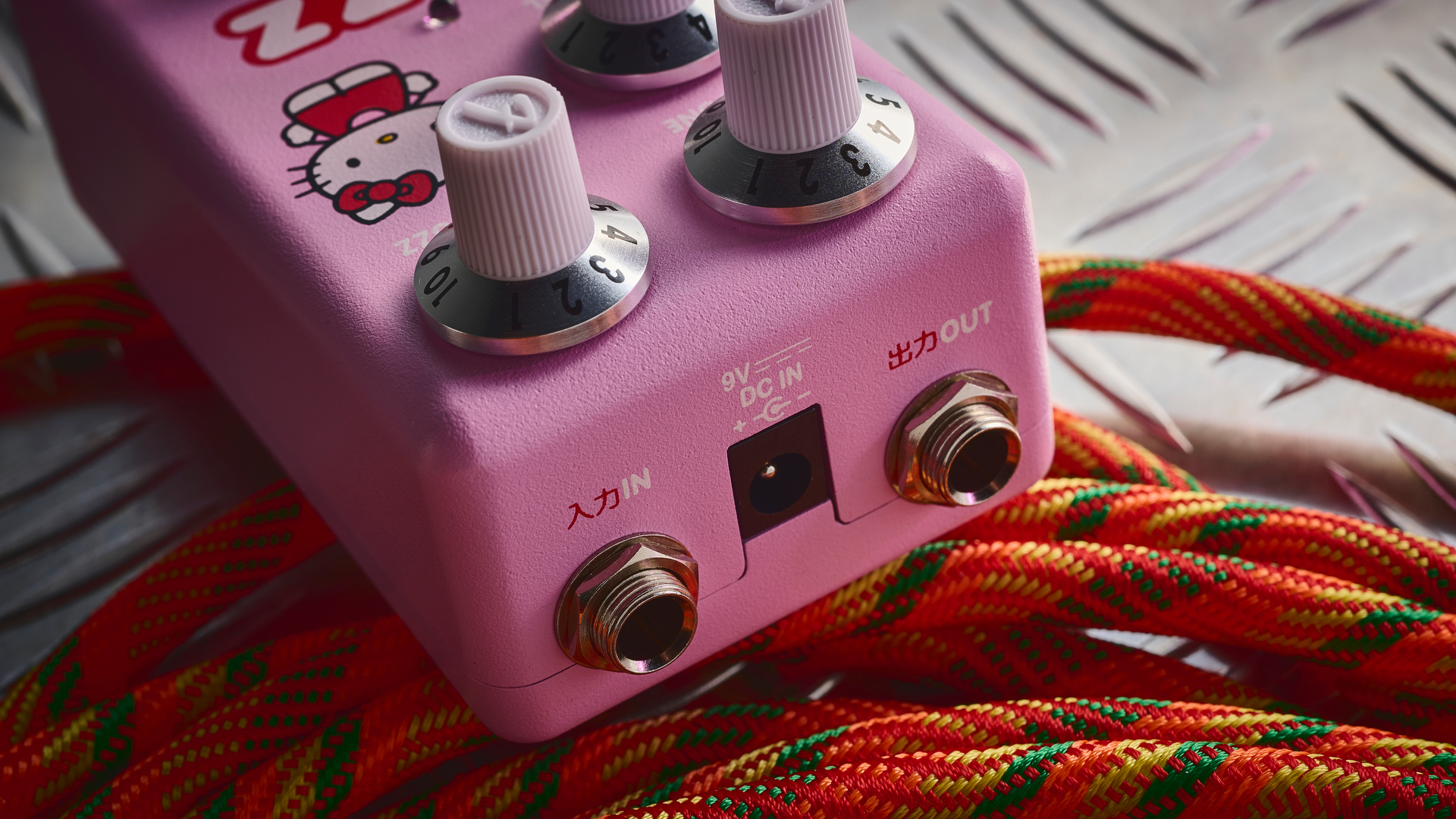
Build quality rating: ★★★★½
All the latest guitar news, interviews, lessons, reviews, deals and more, direct to your inbox!
First off, we have to question whether Hello Kitty is a real cat. She took zero persuading (persuading?) to get out of the box. Not one hiss. Secondly, especially this being so close to Halloween, we had to wonder whether this wasn’t just the Fender Hammertone Fuzz out trick or treating. This, too, shares that same super-rugged metal enclosure design that reassuringly feels heavier than expected.
The Hammertone Fuzz circuit deploys a pair of silicon diodes in service to fuzz sounds of the late ‘60s and early ‘70s. The Hello Kitty Fuzz has an op-amp doing the heavy lifting
It similarly has a trio of 'witches’ hat” amp-style knobs, with the 'F' for Fender branding molded on top. The standard 1/4” input and output jacks are located on the top of the unit, as is the power input (this takes 9V DC from a pedalboard power supply of your choice, drawing 80mA, or you can use a battery). Like the Hammertone series, this is a compact and pedalboard-friendly proposition.
Sadly there is no room for an octave toggle switch – or any secondary mode switches – here, not if we want to accommodate the graphic, but then what we have here is a very different circuit. The Hammertone Fuzz circuit deploys a pair of silicon diodes in service to fuzz sounds of the late ‘60s and early ‘70s. The Hello Kitty Fuzz has an op-amp doing the heavy lifting. A white LED lets you know when the effect is engaged but it is a little hard to see. We are reviewing the Pink enclosure; which seems less of a problem than it could be for the White version.
Usability
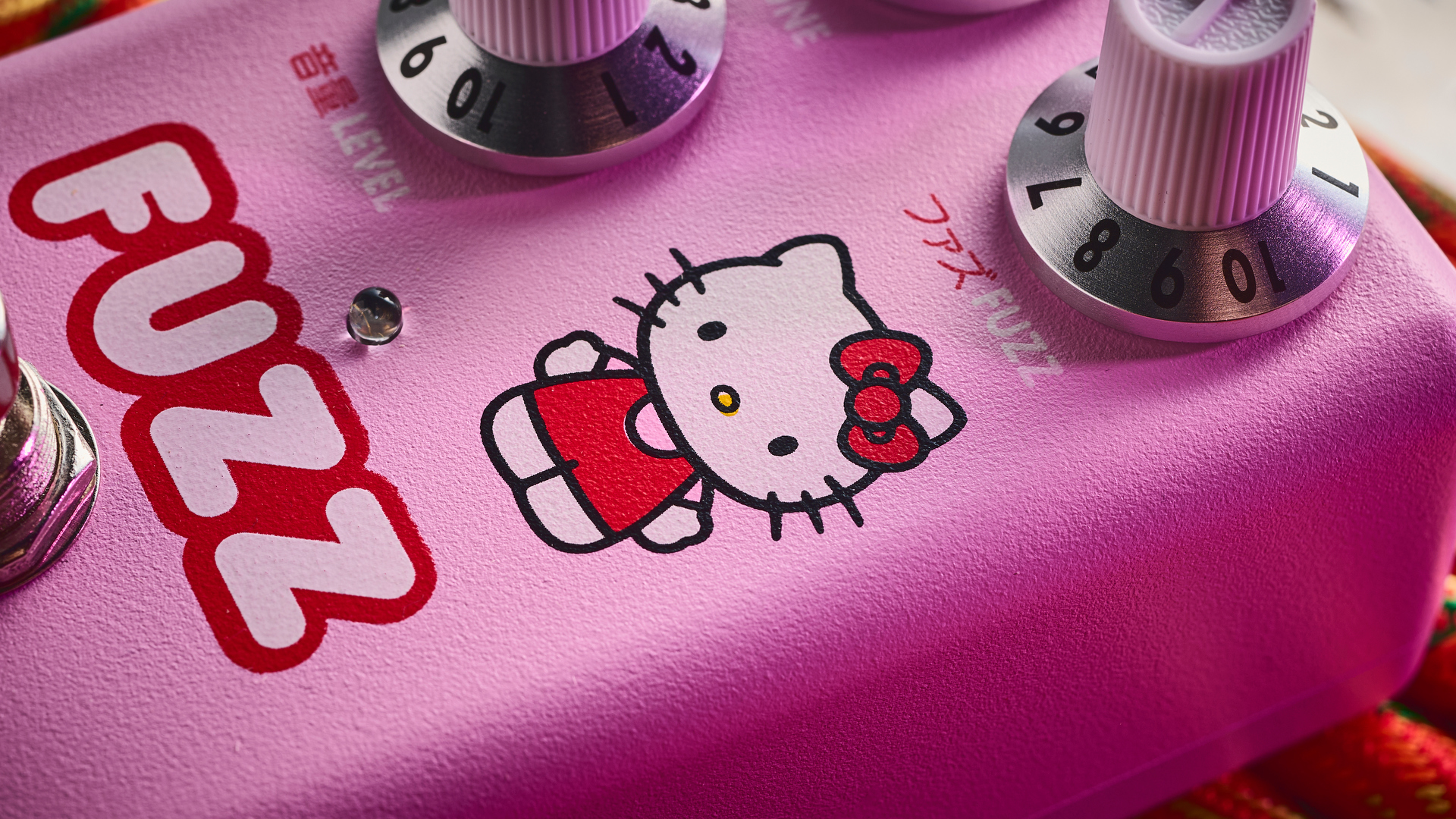
Usability rating: ★★★★☆
One neat touch on the Hello Kitty Fuzz is the legends under the controls are in English and Japanese but unless you are part eagle you will have little chance of making them out without holding the pedal up to the light. Zero chance on the stage. Luckily, there are only three knobs to familiarize yourself with, and the numbers around the dial are easily legible.
The pedal is true bypass. The footswitch makes a satisfying clunk when you step on it. All things considered, we prefer silent switches but at $99 we are not complaining. Nor are we touching the internal trimpot if we can help it. That way madness lies.
Sounds
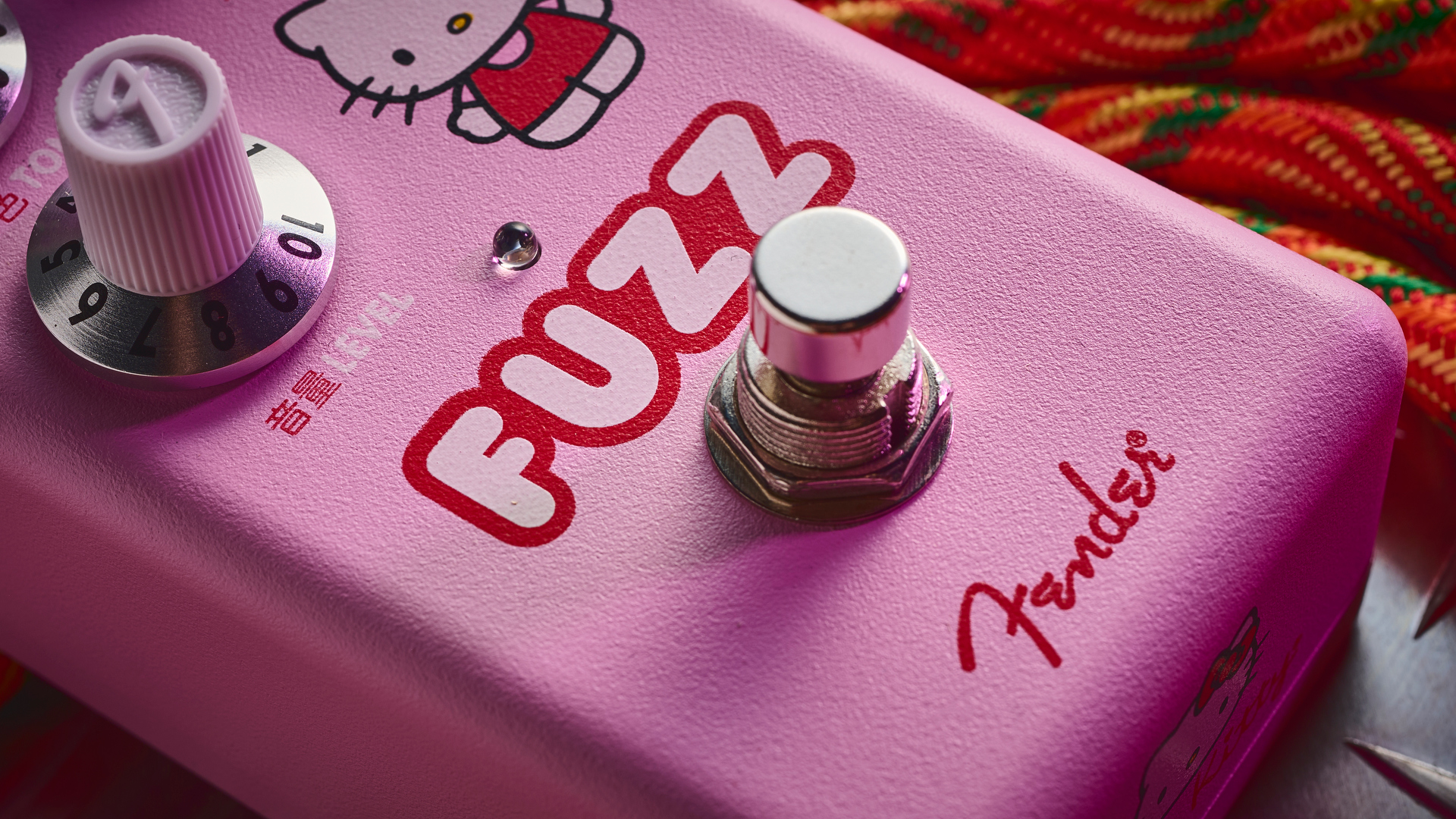
Sounds rating: ★★★★☆
At extreme settings, this fuzz is more Cujo than Hello Kitty
With all that in mind, we started with everything on 10, on a bridge humbucker, a tube amp with just a hint of breakup and wowzers! There is a lot more woof here than you might expect, especially when we rolled the tone knob back on the guitar. Talk about crossing the streams; this was human sacrifice, cats and dogs living together, mass hysteria… Fender could have stuck a German Shepherd on the box and no one would be complaining.
At extreme settings, this fuzz is more Cujo than Hello Kitty. Those settings might not be usable for most players but it is reassuring to find all that volume and fuzz and chaos in a pedal whose trade dress took kawaii-culture global .
Dialling it all back, starting at noon like you do whenever you are in a guitar store, and now you’re talking. There’s a warmth to it. Gradually up the fuzz and there are a lot of sweet spots to be found. It’s funny how fuzz can change character in real-time as you play. This, of course, is not unique to the Hello Kitty Fuzz. Nonetheless, it’s part of the experience, that you can hit a chord and it’s got a bit of bite, then play a single-note line and it’s got that sustaining, violining quality.
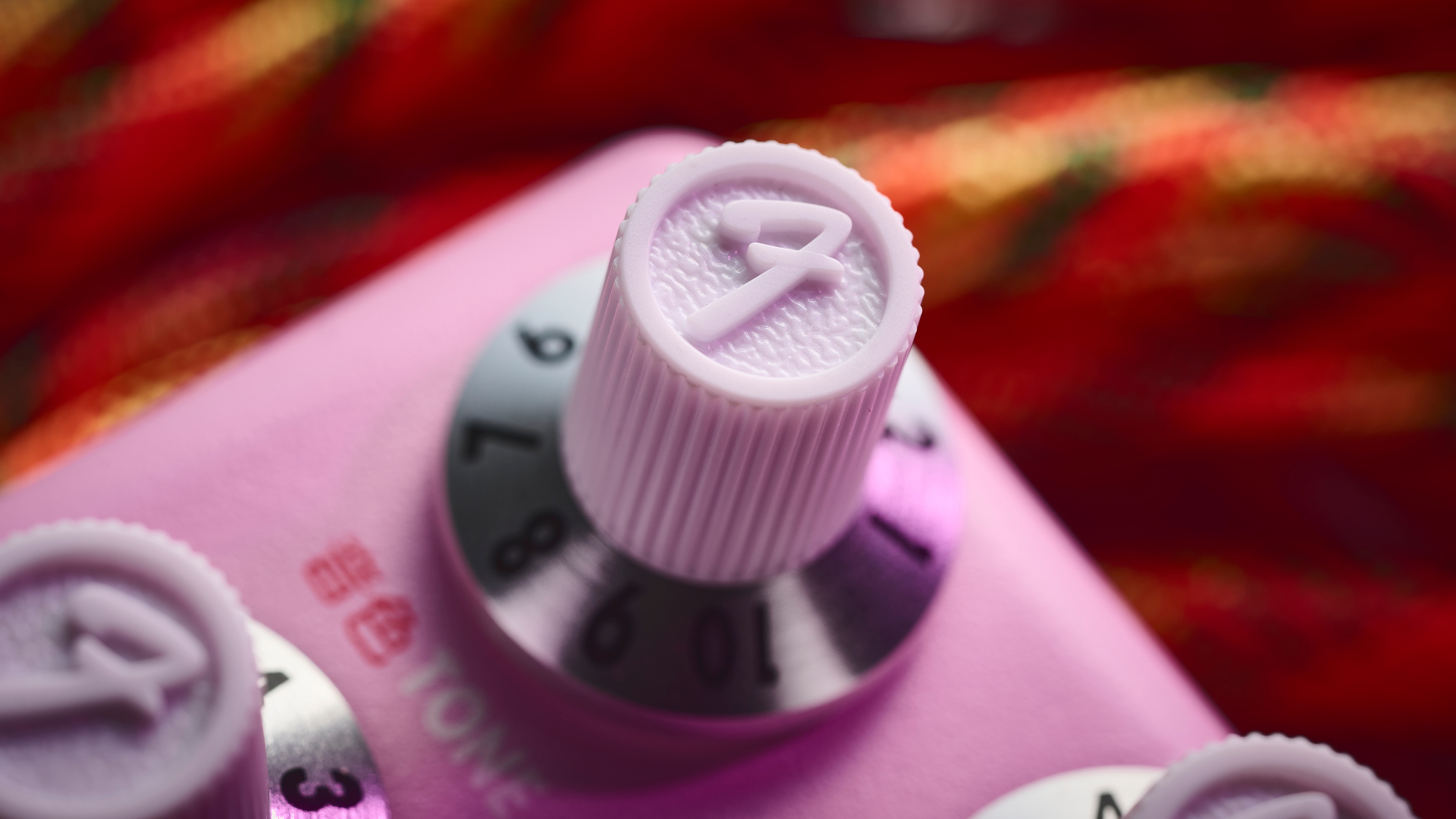
You can make the argument that the Hello Kitty Fuzz is at its best with the Fuzz generously applied
When we think op-amp fuzzes, we tend to think Siamese Dream. That was Billy Corgan’s favorite flavor of fuzz back then, and you can definitely dial in some Cherub Rock-sounding tones.
There’s plenty of action on that Tone control. You could cut crystal with our Telecaster’s bridge single-coil but rolling it back on the pedal smooths the top-end off a little. Conversely, that Tone can apply a bit of sheen and fizz. You can make the argument that the Hello Kitty Fuzz is at its best with the Fuzz generously applied; it teases out pleasing overtones, and as ridiculous as it might seem to recommend a product with Hello Kitty on the front as a decent option for woolly stoner metal riffs, we’re going to do it.
Fuzz divides opinion. Sometimes it can feel a bit empty when it is the only dirt box in your signal chain and it’s feeding a clean guitar amp; it needs something underneath it. Stacking the Hello Kitty with a drive pedal – don’t go overboard – or dial in a bit of break-up on your amp and there are some great textures to work with, tones for garage rock and that ‘70s jam band vibe.
Verdict
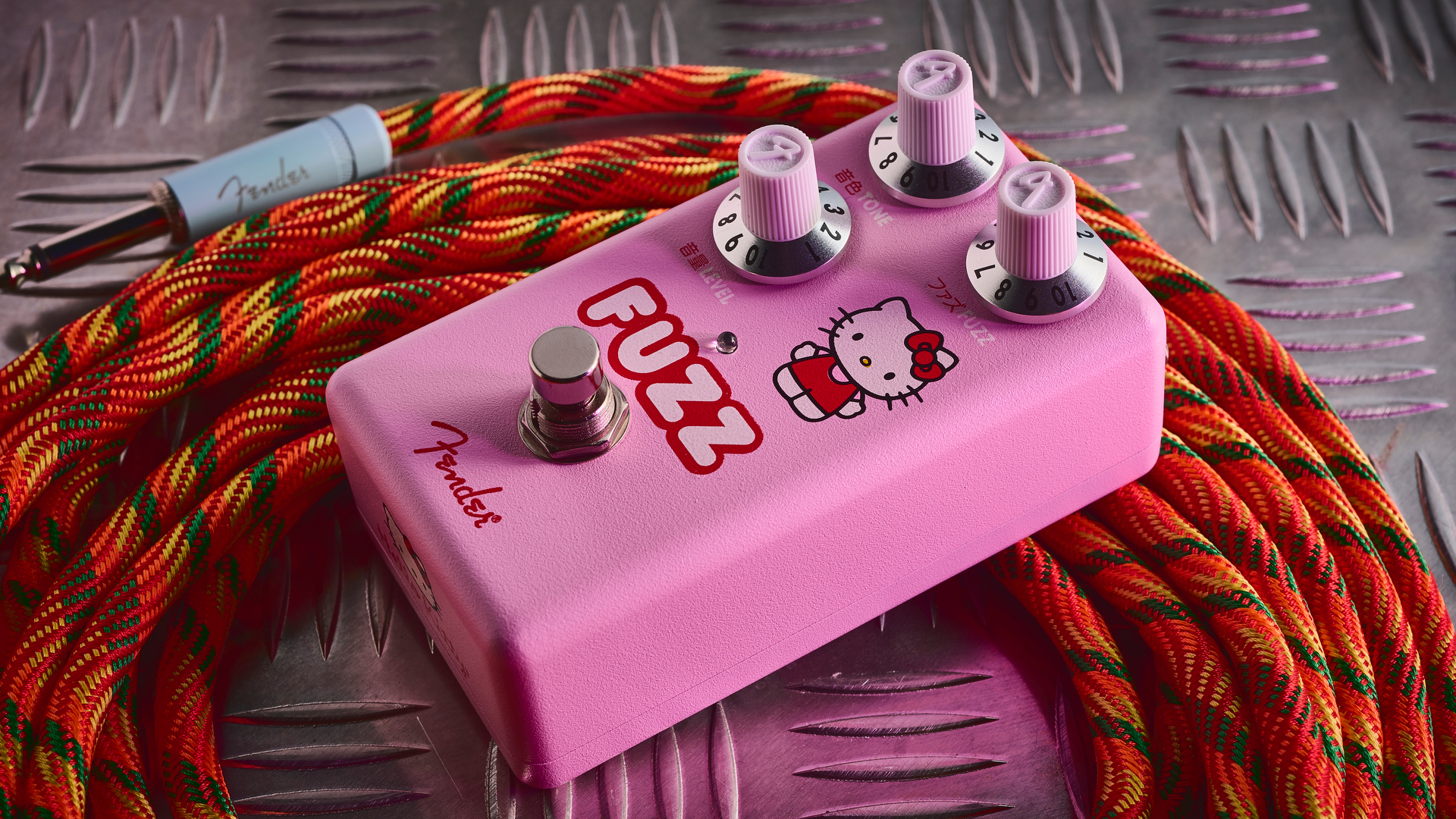
So yes, we have another pop-cultural crossover moment here, a commercial collaboration for the collectors. Is it worth it? Sure. For fans of Hello Kitty, it’s a no-brainer – add-to-cart, collect the whole set. But even for those who might be put off by the aesthetic, queasy at all things cute, the hype, whatever, an op-amp fuzz with this much gain on tap, with the capability to clean up nicely, and a super-easy three-knob layout is always welcome on the pedalboard.
All things considered, the Hello Kitty Fuzz justifies its $99 price tag
It could be worthwhile trying this out alongside Fender’s Hammertone Fuzz to see which you prefer; they offer two distinct flavors, and the octave feature allied to the fact you can pick one up for $79, might recommend the latter.
Fuzz-agnostics are always advised to audition as many different pedals as you can. Some will surprise you. This could well, too. All things considered, the Hello Kitty Fuzz justifies its $99 price tag, and confirms what we have always suspected; that the world needs more animal-themed pedals, cute or otherwise.
Guitar World verdict: The Hello Kitty Fuzz looks so cute. But don’t be fooled. Like many of her feline counterparts, animal passions stir within, with a sound so mean you worry this fuzz will walk off your ‘board one night and return with a songbird in its mouth.
| Test | Results | Score |
|---|---|---|
| Build quality | Pleasingly hefty, cute but rugged. | ★★★★½ |
| Usability | Lacking an octave mode but very easy to use. | ★★★★☆ |
| Sounds | Can get woolly, but there's plenty of gain and cleans up nicely. | ★★★★☆ |
| Overall | Don't let the friendly look fool you – this fuzz can get fierce. | ★★★★☆ |
Also try
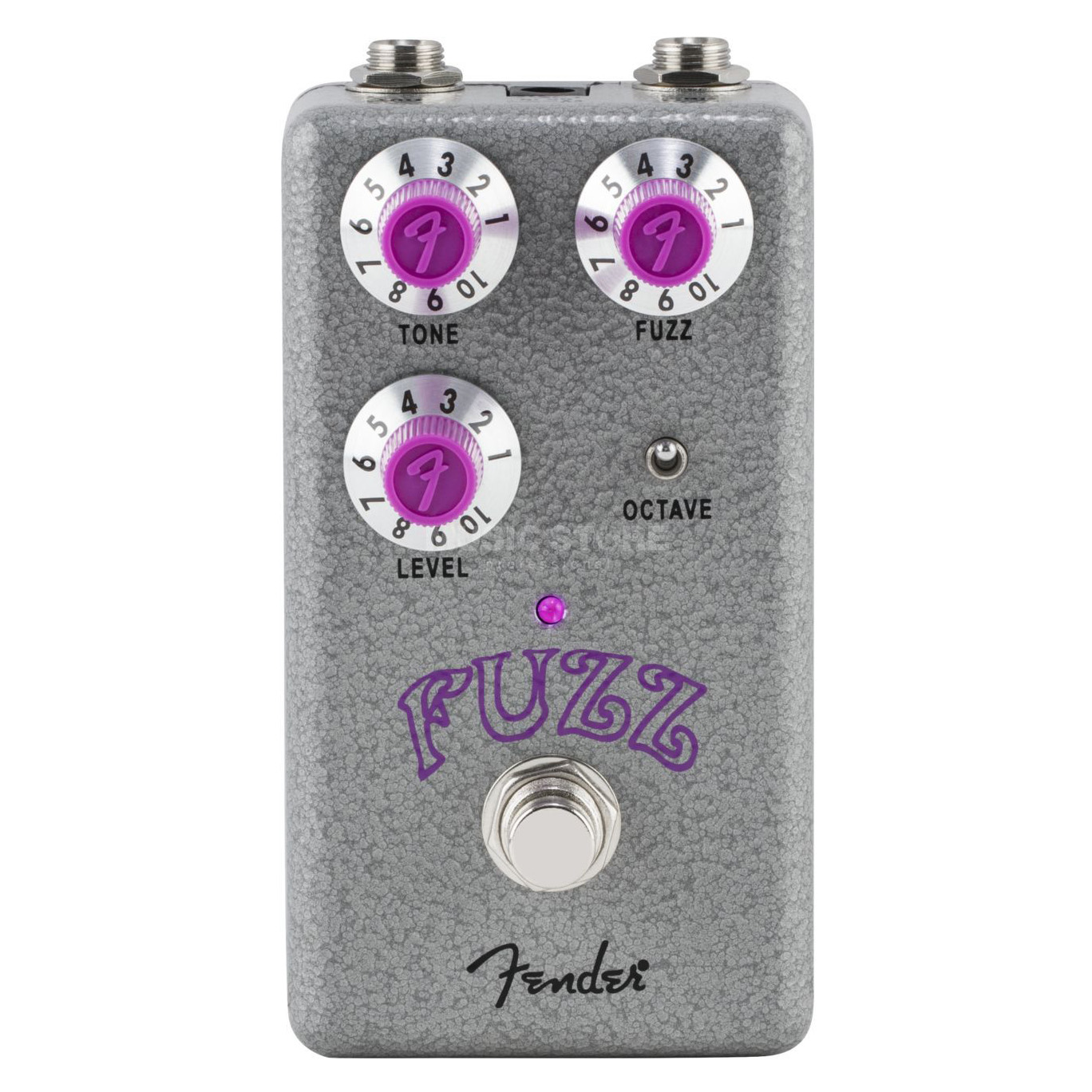
$79/£65/€79
Built similarly tough, similarly compact, this silicon fuzz has a fun switchable octave mode.
Read our review
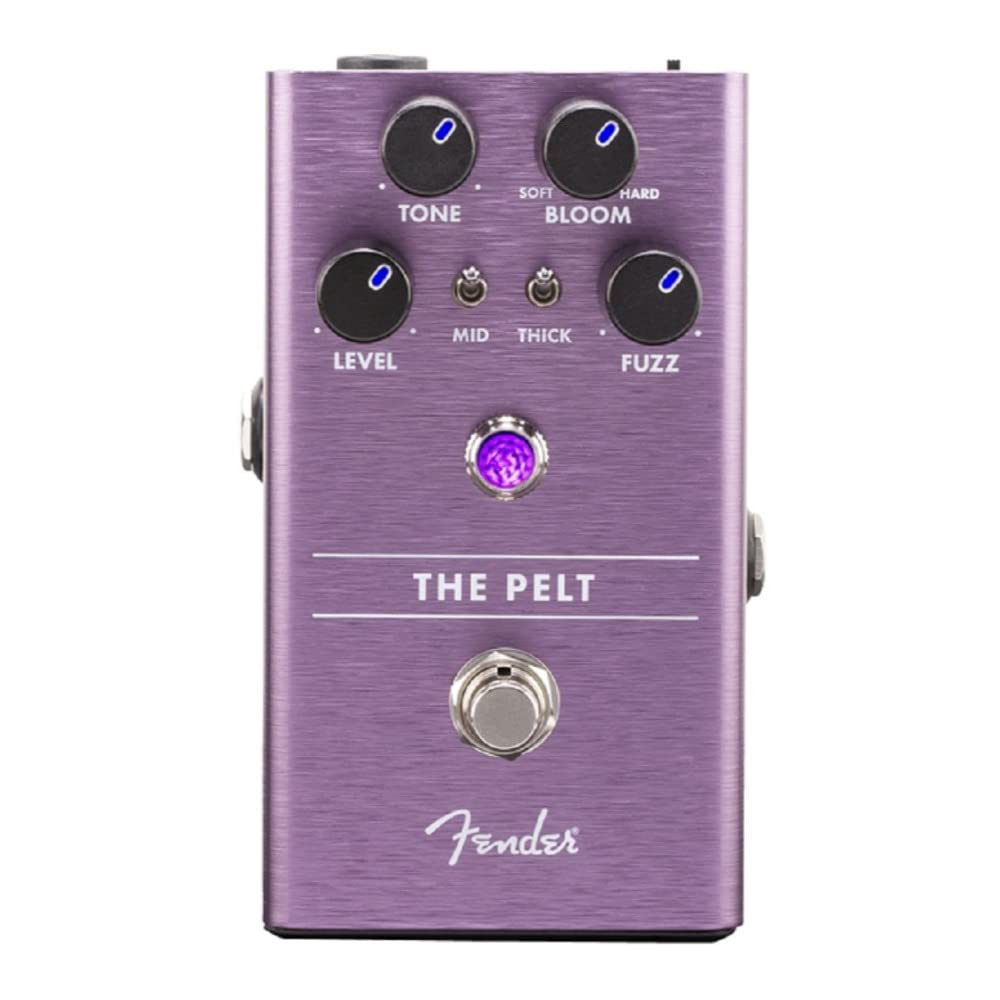
$149/£115 /€135
The Big F’s big fuzz is a classic-sounding silicon fuzz with the controls to tame its wilder sounds. It was an early triumph for Fender’s refreshed pedal lineup.
Read our review
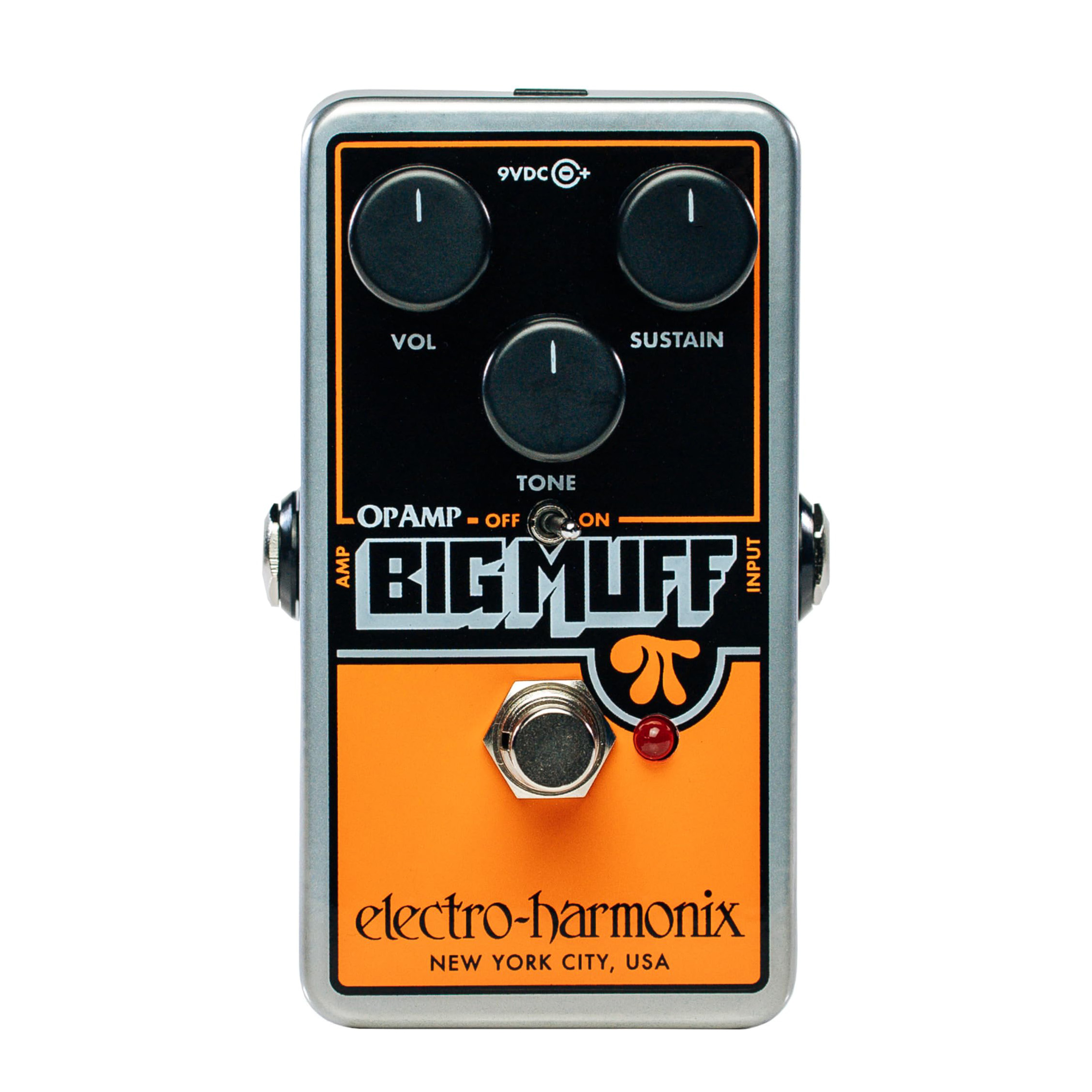
$96/£75 /€85
It’s the evergreen orange box for creating wall of sound grunge and punk tones. Affordable, musical, and fun.
Read our review
Hands-on videos
Beers N Gears
Joe Hart
Guitar Center
Jonathan Horsley has been writing about guitars since 2005, playing them since 1990, and regularly contributes to publications including Guitar World, MusicRadar and Total Guitar. He uses Jazz III nylon picks, 10s during the week, 9s at the weekend, and shamefully still struggles with rhythm figure one of Van Halen’s Panama.
